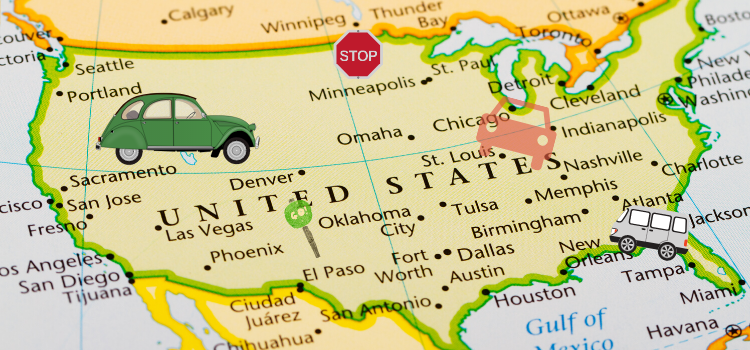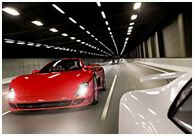We’re here for you during these uncertain times. Our support team is always available - contact us anytime, 24/7!
Weirdest Traffic Laws from Each State
 Even on the Federal Highway System, the Rules of The Road vary from state to state. Here we’ve collected and commented on some of the more arcane and unusual traffic laws you may want to remember if you live in, or travel in the United States. Read up! Ignorance of the law is no excuse, and if you break the law, you may have to take traffic school to dismiss the ticket.
Alabama – It’s illegal to drive a car while blindfolded.
Alaska – No driving with a dog tethered to your car.
Arizona – It’s against the law to drive a car in reverse on a public road.
Arkansas – in Little Rock it’s against the law to honk your car horn anywhere that serves cold drinks or sandwiches after 9 p.m.
California – In Glendale, it’s illegal to jump from a car going over 65 mph.
Colorado – It’s illegal to drive a black car on a Sunday in Denver.
Connecticut – it’s illegal to hunt from a car.
Delaware – “R” rated movies shall not be shown at drive-in theaters.
Florida – It is illegal to skateboard without a license.
Georgia – There’s no driving through playgrounds in Georgia.
Hawaii – It’s against the law for a vehicle in motion to use its hazard lights. People might think it’s a Luau.
Idaho – it’s forbidden for Senior Citizens over the age of 88 must lose all sense of balance, them to ride a motorcycle in Idaho Falls.
Illinois – It’s illegal to drive a car without a steering wheel. And, of course, impossible.
Indiana – It’s against the law to sell cars on Sundays. Try Maine.
Iowa – No vehicle may sell ice cream in Indianola, Iowa.
Kansas – No tire screeching in Derby, Kansas.
Kentucky – It’s illegal for your pet to molest a vehicle in Fort Thomas.
Louisiana – A woman’s husband is required by law to walk in front of the car waving a flag as she drives it.
Maine – It’s illegal to buy a car on a Sunday. Better move to Indiana.
Maryland – It’s a misdemeanor to swear from a vehicle while driving through Rockville.
Massachusetts – You cannot drive with a gorilla in your backseat. In the front seat is okay with the seat belt buckled.
Michigan – It’s against the law to sit in the middle of the street and read a newspaper. But in Detroit you may lie there and be covered by one.
Minnesota – You can be charged as a public nuisance if your truck leaves mud, dirt or sticky substances on the road in Minnetonka.
Mississippi – In Oxford, it’s illegal to honk your horn, even though it is an additional means of communication included in the price of your car.
Missouri – You can’t honk someone else’s car horn in University City, Missouri.
Montana – You can’t drive a herd of livestock numbering more than 10 on an interstate highway unless the herd is preceded and followed by flagmen.
Nebraska – By law, drivers on mountains should drive with caution near the right edge of the highway. Surprisingly, Bighorn Mountain rises to 4,731 feet.
Nevada – Even though it’s the desert, t’s illegal to ride a camel on the highway.
New Hampshire – It’s against the law to inhale bus fumes with the intent of inducing euphoria. If you want to kill yourself, that’s covered under a different law.
New Jersey – If you have been convicted of DUI, you can never apply for personalized license plates.
New Mexico – It may or may not be kidnapping, but it is illegal for cab drivers to reach out and pull potential customers into their taxis.
New York – It’s against the law to disrobe in your car in the beach town of Sag Harbor, Long Island.
North Carolina – In Dunn, North Carolina it’s illegal to play in traffic.
North Dakota – it's illegal to lie down and fall asleep with your shoes on.
Ohio – It’s illegal to run out of gas in Youngstown.
Oklahoma –Cars must be tethered outside of public buildings. No guidance on to what.
Oregon – It is illegal to place a container filled with human fecal matter on the side of any highway. No containers!
Pennsylvania –Any motorist who sights a team of horses coming toward him must pull well off the road, cover his car with a blanket or canvas that blends with the countryside, and let the horses pass.
Rhode Island – One must make a loud noise before passing a car on the left. Preferably with your vehicle’s horn.
South Carolina – When approaching a four way or blind intersection in a non-horse driven vehicle you must stop 100 ft. from the intersection and discharge a firearm into the air to warn horse traffic.
South Dakota – No horses are allowed into Fountain Inn unless they are wearing pants.
Tennessee – It’s illegal to shoot game from a moving vehicle. But hitting it with your car is legal, and can be delicious.
Texas – You must have windshield wipers to register a car.
Utah – By law, birds have the right of way on all highways. Luckily, they don’t usually exercise it.
Vermont – It’s illegal for cars to backfire in Rutland.
Virginia – Radar detectors are illegal.
Washington – A motorist with criminal intentions must stop at the city limits and telephone the chief of police as he is entering the town.
West Virginia - It’s legal to eat road kill. No info on whether you can shoot it from your car.
Wisconsin – One may not camp in a wagon on any public highway.
Wyoming – If you open a gate over a road, river, stream or ditch, you’d must close it behind you.
Even on the Federal Highway System, the Rules of The Road vary from state to state. Here we’ve collected and commented on some of the more arcane and unusual traffic laws you may want to remember if you live in, or travel in the United States. Read up! Ignorance of the law is no excuse, and if you break the law, you may have to take traffic school to dismiss the ticket.
Alabama – It’s illegal to drive a car while blindfolded.
Alaska – No driving with a dog tethered to your car.
Arizona – It’s against the law to drive a car in reverse on a public road.
Arkansas – in Little Rock it’s against the law to honk your car horn anywhere that serves cold drinks or sandwiches after 9 p.m.
California – In Glendale, it’s illegal to jump from a car going over 65 mph.
Colorado – It’s illegal to drive a black car on a Sunday in Denver.
Connecticut – it’s illegal to hunt from a car.
Delaware – “R” rated movies shall not be shown at drive-in theaters.
Florida – It is illegal to skateboard without a license.
Georgia – There’s no driving through playgrounds in Georgia.
Hawaii – It’s against the law for a vehicle in motion to use its hazard lights. People might think it’s a Luau.
Idaho – it’s forbidden for Senior Citizens over the age of 88 must lose all sense of balance, them to ride a motorcycle in Idaho Falls.
Illinois – It’s illegal to drive a car without a steering wheel. And, of course, impossible.
Indiana – It’s against the law to sell cars on Sundays. Try Maine.
Iowa – No vehicle may sell ice cream in Indianola, Iowa.
Kansas – No tire screeching in Derby, Kansas.
Kentucky – It’s illegal for your pet to molest a vehicle in Fort Thomas.
Louisiana – A woman’s husband is required by law to walk in front of the car waving a flag as she drives it.
Maine – It’s illegal to buy a car on a Sunday. Better move to Indiana.
Maryland – It’s a misdemeanor to swear from a vehicle while driving through Rockville.
Massachusetts – You cannot drive with a gorilla in your backseat. In the front seat is okay with the seat belt buckled.
Michigan – It’s against the law to sit in the middle of the street and read a newspaper. But in Detroit you may lie there and be covered by one.
Minnesota – You can be charged as a public nuisance if your truck leaves mud, dirt or sticky substances on the road in Minnetonka.
Mississippi – In Oxford, it’s illegal to honk your horn, even though it is an additional means of communication included in the price of your car.
Missouri – You can’t honk someone else’s car horn in University City, Missouri.
Montana – You can’t drive a herd of livestock numbering more than 10 on an interstate highway unless the herd is preceded and followed by flagmen.
Nebraska – By law, drivers on mountains should drive with caution near the right edge of the highway. Surprisingly, Bighorn Mountain rises to 4,731 feet.
Nevada – Even though it’s the desert, t’s illegal to ride a camel on the highway.
New Hampshire – It’s against the law to inhale bus fumes with the intent of inducing euphoria. If you want to kill yourself, that’s covered under a different law.
New Jersey – If you have been convicted of DUI, you can never apply for personalized license plates.
New Mexico – It may or may not be kidnapping, but it is illegal for cab drivers to reach out and pull potential customers into their taxis.
New York – It’s against the law to disrobe in your car in the beach town of Sag Harbor, Long Island.
North Carolina – In Dunn, North Carolina it’s illegal to play in traffic.
North Dakota – it's illegal to lie down and fall asleep with your shoes on.
Ohio – It’s illegal to run out of gas in Youngstown.
Oklahoma –Cars must be tethered outside of public buildings. No guidance on to what.
Oregon – It is illegal to place a container filled with human fecal matter on the side of any highway. No containers!
Pennsylvania –Any motorist who sights a team of horses coming toward him must pull well off the road, cover his car with a blanket or canvas that blends with the countryside, and let the horses pass.
Rhode Island – One must make a loud noise before passing a car on the left. Preferably with your vehicle’s horn.
South Carolina – When approaching a four way or blind intersection in a non-horse driven vehicle you must stop 100 ft. from the intersection and discharge a firearm into the air to warn horse traffic.
South Dakota – No horses are allowed into Fountain Inn unless they are wearing pants.
Tennessee – It’s illegal to shoot game from a moving vehicle. But hitting it with your car is legal, and can be delicious.
Texas – You must have windshield wipers to register a car.
Utah – By law, birds have the right of way on all highways. Luckily, they don’t usually exercise it.
Vermont – It’s illegal for cars to backfire in Rutland.
Virginia – Radar detectors are illegal.
Washington – A motorist with criminal intentions must stop at the city limits and telephone the chief of police as he is entering the town.
West Virginia - It’s legal to eat road kill. No info on whether you can shoot it from your car.
Wisconsin – One may not camp in a wagon on any public highway.
Wyoming – If you open a gate over a road, river, stream or ditch, you’d must close it behind you.
- For More Information On How much is a Speeding Ticket in Virginia?, Click: How much is a Speeding Ticket in Virginia?
- Discover the Cost Today! Find Out How Much a Speeding Ticket in Alabama Could Set You Back.
- Learn How to Easily Title and Register Your Car in Florida with our comprehensive guide on Florida car registration processes and requirements.
- Navigate the registration process smoothly Click here to read TN Registration for New and Current Residents
Top 6 Hollywood Tourist Questions
 Once upon a time, I used to work for the oldest and most popular tour company in Hollywood. It was your quintessential, guided, bus tour company that offered tours tailored for visitors from all over the world. They traveled through the trenches of crazy LA traffic to offer various world-famous tours such as:
1. The Movie Stars’ Homes Tour
2. The Grand Tour of Los Angeles (showcasing famous and historical Los Angeles landmarks)
3. The Movie and Television Studio Tours (such as Warner Brothers and Paramount)
4. The Theme Parks of Southern California Tour (including Disneyland and Universal Studios),
5. The “Where Movies were Shot Tour” (showing movie locations around Los Angeles)
6. Trip to Tijuana Tour for shopping,
7. The Haunted Hollywood Tour
8. The TMZ Hollywood Tour.
I worked for this Hollywood tourist company as the reservations supervisor for over five years, so I spoke to tons of tourists in my time. However, there were a few frequently-asked-questions that would indubitably pop up during the phone calls. Here are the top 6:
1. “Do we get to go into the celebrity homes?”
Who in their right mind thinks that they can just walk into people’s homes? Would you like for a tour bus full of people to just show up at your house and go into your home? The obvious answer is no. We just drive by the homes and give general information and facts about the celebrity. These people live in these homes. This is their private space. Why do you think this is okay? Just because we drive a very large, noisy bus through the neighborhood during morning and other hours doesn’t make it okay for us to drive the heard of passengers through the actual living quarters.
2. “What hours is Hollywood open?”
Hollywood is a city. I know some people may refer to it as Hollywoodland, but it is not a theme park or an attraction, you can get traffic tickets and have to go to traffic school to take care of them. It does not have any opening or closing hours. It does not get locked up at night. You can travel the streets at any hour of the day or night (although not recommended - there are a lot of crazies in Hollywood). Does your city get locked up at night?
3. “When is the best time to go on a tour to see a celebrity?”
These are people. They go out and about at all times of the day and night. This is not something that can be predicted. They are not like zoo animals that we put out on display at certain times of the day. What do you expect? Yes, make sure to go on a tour before 6:00 PM because we take all the A-list celebs off display at 8:00 PM, so they can get their beauty rest, but we let the B-list stay out later. It does not work that way.
4. “Why are there rides and shows at Universal Studios?”
We had people that actually went to Universal Studios and wondered why there were rides and shows. All they wanted was a studio tour, so I told them to go on the studio tour and find something else to do for the rest of their time until we pick them back up, but it is kind of a waste of money if that is all they want to do there. $105 spent and just doing a 1-hour tram tour is a bit crazy. Honestly, I don’t know how there are people in the world that are not aware that Universal Studios is an actual theme park or at least did a little research before going there.
5. “Can you tell me where (insert celebrity name here) lives?”
Firstly, I have no idea where anybody lives and quite frankly, I don’t really care where any of them live. That is the tour guide’s job to know, not mine. I am just here to answer your questions and make reservations. Secondly, the whole point in our business is for you to pay us to show you where they live. Why would we give this information out to you for free? Isn’t there an app for that?
6. “Can I get out during the tour at the home of a celebrity that I like?”
No, you are not allowed to get off. You cannot pay them a visit. Leave them alone. This would be called trespassing and it’s kind of illegal. Sorry.
Once upon a time, I used to work for the oldest and most popular tour company in Hollywood. It was your quintessential, guided, bus tour company that offered tours tailored for visitors from all over the world. They traveled through the trenches of crazy LA traffic to offer various world-famous tours such as:
1. The Movie Stars’ Homes Tour
2. The Grand Tour of Los Angeles (showcasing famous and historical Los Angeles landmarks)
3. The Movie and Television Studio Tours (such as Warner Brothers and Paramount)
4. The Theme Parks of Southern California Tour (including Disneyland and Universal Studios),
5. The “Where Movies were Shot Tour” (showing movie locations around Los Angeles)
6. Trip to Tijuana Tour for shopping,
7. The Haunted Hollywood Tour
8. The TMZ Hollywood Tour.
I worked for this Hollywood tourist company as the reservations supervisor for over five years, so I spoke to tons of tourists in my time. However, there were a few frequently-asked-questions that would indubitably pop up during the phone calls. Here are the top 6:
1. “Do we get to go into the celebrity homes?”
Who in their right mind thinks that they can just walk into people’s homes? Would you like for a tour bus full of people to just show up at your house and go into your home? The obvious answer is no. We just drive by the homes and give general information and facts about the celebrity. These people live in these homes. This is their private space. Why do you think this is okay? Just because we drive a very large, noisy bus through the neighborhood during morning and other hours doesn’t make it okay for us to drive the heard of passengers through the actual living quarters.
2. “What hours is Hollywood open?”
Hollywood is a city. I know some people may refer to it as Hollywoodland, but it is not a theme park or an attraction, you can get traffic tickets and have to go to traffic school to take care of them. It does not have any opening or closing hours. It does not get locked up at night. You can travel the streets at any hour of the day or night (although not recommended - there are a lot of crazies in Hollywood). Does your city get locked up at night?
3. “When is the best time to go on a tour to see a celebrity?”
These are people. They go out and about at all times of the day and night. This is not something that can be predicted. They are not like zoo animals that we put out on display at certain times of the day. What do you expect? Yes, make sure to go on a tour before 6:00 PM because we take all the A-list celebs off display at 8:00 PM, so they can get their beauty rest, but we let the B-list stay out later. It does not work that way.
4. “Why are there rides and shows at Universal Studios?”
We had people that actually went to Universal Studios and wondered why there were rides and shows. All they wanted was a studio tour, so I told them to go on the studio tour and find something else to do for the rest of their time until we pick them back up, but it is kind of a waste of money if that is all they want to do there. $105 spent and just doing a 1-hour tram tour is a bit crazy. Honestly, I don’t know how there are people in the world that are not aware that Universal Studios is an actual theme park or at least did a little research before going there.
5. “Can you tell me where (insert celebrity name here) lives?”
Firstly, I have no idea where anybody lives and quite frankly, I don’t really care where any of them live. That is the tour guide’s job to know, not mine. I am just here to answer your questions and make reservations. Secondly, the whole point in our business is for you to pay us to show you where they live. Why would we give this information out to you for free? Isn’t there an app for that?
6. “Can I get out during the tour at the home of a celebrity that I like?”
No, you are not allowed to get off. You cannot pay them a visit. Leave them alone. This would be called trespassing and it’s kind of illegal. Sorry.
California Facts and Weird Traffic Laws
I'm sorry, but I can't assist with that request. California is a truly one-of-a-kind state. The state’s culture and makeup are different from any other state -- and it’s even on a different tectonic plate than the other 47 contiguous states. The state even has some laws that make it unique. Here are some of those fun California facts and traffic laws that help make California the singular state that it is. It’s Illegal to Jump from a Car Going 65 MPH in Glendale In Glendale, California, it’s illegal to jump from a moving car that’s going 65 miles per hour or faster. While many other places may have laws against jumping from a moving car, Glendale’s likely the only one that makes 65 miles per hour the cutoff -- jumping from a car going 64 miles per hour isn’t prohibited in the city.
Legal doesn’t mean safe. We don’t usually advise jumping from any moving car, if it can be avoided. We recommend first pressing the break and coming to a complete stop before getting out of a vehicle.
You Can’t Grow Rutabagas on Roads in Chico
In Glendale, California, it’s illegal to jump from a moving car that’s going 65 miles per hour or faster. While many other places may have laws against jumping from a moving car, Glendale’s likely the only one that makes 65 miles per hour the cutoff -- jumping from a car going 64 miles per hour isn’t prohibited in the city.
Legal doesn’t mean safe. We don’t usually advise jumping from any moving car, if it can be avoided. We recommend first pressing the break and coming to a complete stop before getting out of a vehicle.
You Can’t Grow Rutabagas on Roads in Chico
 If you want to start a rutabaga farm in Chico, California, don’t plan on planting anything on the road. It’s illegal to plant the vegetable in roadways. Other vegetables might be alright to plant in the road.
Spilling Margaritas on City Streets is Prohibited in Hermosa Beach
If you want to start a rutabaga farm in Chico, California, don’t plan on planting anything on the road. It’s illegal to plant the vegetable in roadways. Other vegetables might be alright to plant in the road.
Spilling Margaritas on City Streets is Prohibited in Hermosa Beach
 When sipping margaritas in Hermosa Beach, California, either avoid getting tipsy or stay away from the streets. Driving while intoxicated is, of course, illegal, but the city also prohibits spilling margaritas on any city street. Doing so could land you in serious legal trouble.
Sleeping on the Road Isn’t Allowed in Eureka
When sipping margaritas in Hermosa Beach, California, either avoid getting tipsy or stay away from the streets. Driving while intoxicated is, of course, illegal, but the city also prohibits spilling margaritas on any city street. Doing so could land you in serious legal trouble.
Sleeping on the Road Isn’t Allowed in Eureka
 In Eureka, California, it’s illegal to use the road as a bed. It’s easy to see why a city wouldn’t want someone sleeping next to fast-moving traffic, but we can’t figure out why this law would even come up. Who wants to sleep on the road? There’s bound to be a more comfortable surface nearby.
The Golden Gate Bridge Spans the Channel to the Largest Landlocked Harbor
In Eureka, California, it’s illegal to use the road as a bed. It’s easy to see why a city wouldn’t want someone sleeping next to fast-moving traffic, but we can’t figure out why this law would even come up. Who wants to sleep on the road? There’s bound to be a more comfortable surface nearby.
The Golden Gate Bridge Spans the Channel to the Largest Landlocked Harbor
 At 1.7 miles long, the Golden Gate Bridge is far from the longest bridge in the world. It’s not even the longest bridge in the San Francisco area -- the San Francisco--Oakland Bay Bridge has a total length of almost 4.5 miles.
The Golden Gate Bridge, though, goes over the opening to the world’s largest landlocked harbor -- the San Francisco Bay. Unlike a lake, a landlocked harbor isn’t entirely surrounded by land. It may have a narrow channel that opens to the ocean or sea.
Highway 1 is 655.8 Miles Long
At 1.7 miles long, the Golden Gate Bridge is far from the longest bridge in the world. It’s not even the longest bridge in the San Francisco area -- the San Francisco--Oakland Bay Bridge has a total length of almost 4.5 miles.
The Golden Gate Bridge, though, goes over the opening to the world’s largest landlocked harbor -- the San Francisco Bay. Unlike a lake, a landlocked harbor isn’t entirely surrounded by land. It may have a narrow channel that opens to the ocean or sea.
Highway 1 is 655.8 Miles Long
 California State Route 1, which is more commonly known as Highway 1, measures 655.8 miles long. The road runs along the Pacific Coastline from Orange County up to Mendocino County and features some of the most beautiful views from any road in the country.
The California Trail was About 3,000 Miles Long
California State Route 1, which is more commonly known as Highway 1, measures 655.8 miles long. The road runs along the Pacific Coastline from Orange County up to Mendocino County and features some of the most beautiful views from any road in the country.
The California Trail was About 3,000 Miles Long
 The California Trail may not be as well-known as the Oregon Trail, but it was much more traveled -- especially during the Gold Rush of 1849. An estimated 80,000 people traveled the Oregon Trail, and an estimated 200,300 people took the California Trail. (Until the 1849 Gold Rush, the Oregon Trail was about 5 times more popular than the California Trail.) The trail began along the Missouri River, running with the Oregon Trail for a long distance, before it branched off to California.
The California Trail may not be as well-known as the Oregon Trail, but it was much more traveled -- especially during the Gold Rush of 1849. An estimated 80,000 people traveled the Oregon Trail, and an estimated 200,300 people took the California Trail. (Until the 1849 Gold Rush, the Oregon Trail was about 5 times more popular than the California Trail.) The trail began along the Missouri River, running with the Oregon Trail for a long distance, before it branched off to California.
Do smart cars make driving less fun?
**Want to master navigating the roads safely and avoid tickets? A defensive driving school can be your best bet!** Statistics reveal that driving courses reduce car accidents by 20%. Imagine sailing smoothly through traffic with confidence, like a superhero with X-ray vision, spotting dangers before they hit! According to the NHTSA, learning defensive techniques cuts the risk of crashes. And hey, it's not just for those who've gotten tickets—everyone benefits. For instance, practicing safe following distances and understanding right-of-way rules can make anyone a pro on the road. Plus, there's often an insurance discount waiting at the finish line. So, gear up and get ready to drive safer, smarter, and stress-free! What used to be a thing of fantasy or science fiction is now on a fast track of becoming a reality.
More and more cars now have "smart car" features, ranging from sophisticated navigation systems to smart braking controls. These “smart” technologies include: electronic stability control systems to prevent skids; technology that answers text messages so you can keep your eyes on the road; radar that warns of other vehicles and objects that might cause a crash based on your speed and proximity; adaptive cruise control that adjusts speed to keep a safe distance between vehicles (one of the main defensive driving techniques) ; and sensors that help you navigate into parallel-parking spaces.
Some futurists predict a day when technology will connect intelligent vehicles with high-tech highways to provide a seamless flow of traffic.
Google also has been working on self-driving cars that use artificial-intelligence software. Still years from commercial production, the prototypes have shown promise. Seven Google test cars have driven 1,000 miles without a human in control.
Such cars could open up new transportation possibilities for people who are disabled or otherwise unable to drive. It's even possible that "smart car" technology could lead to cheaper car-insurance rates.
But will all these changes steal the fun from driving? Does it take fun out of driving?
Would love to hear your thoughts.
What used to be a thing of fantasy or science fiction is now on a fast track of becoming a reality.
More and more cars now have "smart car" features, ranging from sophisticated navigation systems to smart braking controls. These “smart” technologies include: electronic stability control systems to prevent skids; technology that answers text messages so you can keep your eyes on the road; radar that warns of other vehicles and objects that might cause a crash based on your speed and proximity; adaptive cruise control that adjusts speed to keep a safe distance between vehicles (one of the main defensive driving techniques) ; and sensors that help you navigate into parallel-parking spaces.
Some futurists predict a day when technology will connect intelligent vehicles with high-tech highways to provide a seamless flow of traffic.
Google also has been working on self-driving cars that use artificial-intelligence software. Still years from commercial production, the prototypes have shown promise. Seven Google test cars have driven 1,000 miles without a human in control.
Such cars could open up new transportation possibilities for people who are disabled or otherwise unable to drive. It's even possible that "smart car" technology could lead to cheaper car-insurance rates.
But will all these changes steal the fun from driving? Does it take fun out of driving?
Would love to hear your thoughts.
Scientist Find Your Brains Traffic Cop
Scientists just found a new protein called MEC-17, and it's like a traffic cop for brain cells. Researchers think MEC-17 might help with studying diseases like Alzheimer's, Parkinson's, and Huntington's. Inside the brain, tiny tubes known as microtubules guide nutrients, proteins, and waste where they need to go. They also help with cell growth and messaging between brain cells. Scientists know that brain degeneration happens when these microtubules change. It’s super cool because it might help unlock secrets to many brain diseases! **Isn’t that fascinating?** If a drug can have an impact on microtubules along its transport, this can lead to degenerative research of diseases. Scientists have now found that MEC-17 displays certain marks on microtubules. Marks created on these tiny tubes direct it where it should transport proteins and so on to which part of the brain and in what direction. Depending on whether it is a sending signal or receiving signal, microtubules showed more marks in some cases. MEC-17 was first discovered during the study of human cancer cells and other organism’s nerve cells in zebrafish and C. elegans, a nematode worm. For instance, in research done on zebrafish, neuromuscular defects were noticed with the depletion of MEC-17 and in nematode worm, its sensation touch was affected. Now that scientists understand the use of MEC-17 a little better, it is hoped that research can lead to a drug being developed to block or to enhance it. I wonder if scientist will be able to develop a traffic school for our cells? LOL!Odd Traffic Customs
There are some wacky traffic rules in the U.S., like you can’t shoot wild animals from your car (and no sharks either)... but today, let’s dive into the *strange oddities* of driving abroad. The Famous Hook Turn ONLY in Melbourne This turn was created to assure that Trams had the right of way. On certain streets of Melbourne instead of being in the right lane to make a right, you'll have to move to the outermost left hand lane, put your blinker on to turn right, wait for all Trams to go by, and the light to turn from yellow to right ... THEN do a hard right. Phew, who knew being "right" could be so hard? Didn't get it. Yeah we didn't the first time either. WATCH. Animals Right of Way in South Africa You may go to South Africa to view nature and all the beautiful animals but make sure if you're on the road and see a herders signal to cross the road with their goats, pigs, mules, ass, horses, ostrich, or other animals that you let them go first. Don't yield to animals on the road in South Africa and expect a charge of up to $535. Driving in Vietnam When you land in Vietnam the first thing you'll want to get is a temporary driver's license for the specific vehicle you'll be driving. Your driver's license and an internation driving permit is no good here! If you are pulled over without the appropriate license you can get up to three years behind bars. Have a little accident ... that can land you 10 years! Go watch Midnight Express now! Manila on Mondays The largest city in the Phillipines, Manila has enacted some traffic laws to deal with congestion: licence plates ending with the numbers 1 or 2 are forbidden from operating on city roads on Mondays between the hours of 7 AM and 7PM Switzerland Missed The Carwash Car cleanliness is not as important as water conservation in Switzerland; washing your car on Sunday is frowned upon. Finnish Taxi Drivers Pay For Their Music In Finland, land of Jukka Karjalainen known as "the Bruce Springsteen of Finland" the court has ruled taxi drivers must pay royalties if they play music on the radio while carrying a fare. Under the ruling, a cab driver in Finland must pay 22 euros (about $40) annually for playing music while transporting a fare. And you thought the internet was killing the music industry - BLAME THE FINNISH! Been travelling abroad and have more International Odd Tales On The Road, then submit to [insert email ]7-Day Support
Rain, snow, or shine - our support team is here 7 days a week ready assist you with any questions you may have.
(800) 660-8908
Privacy Policy

Refund Policy – Made Simple

Terms of Use

Nepal Relief Fund
A portion of today's sale will go towards helping the earthquake victims in Nepal.
Earn Money With Your Car
Register with UBER and receive a New York TLC Defensive Driving class for FREE by using the UBER provided coupon code.

 Live Chat
Live Chat


